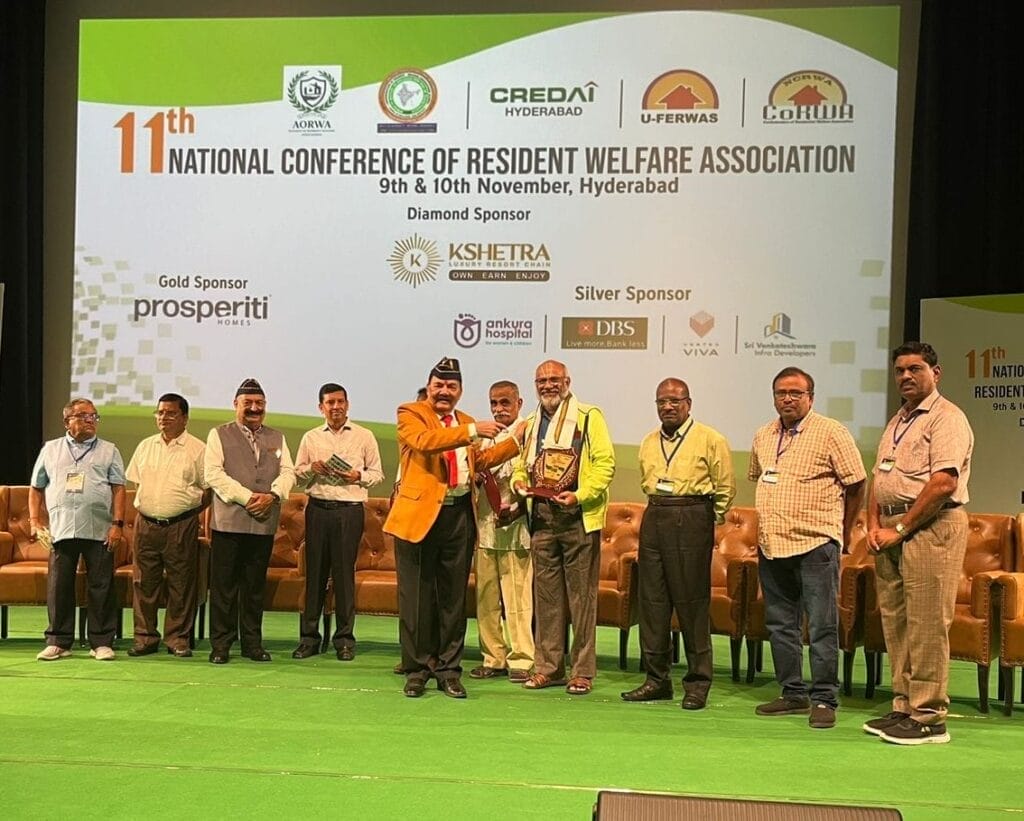The impact of climate change on urban habitats is a sombre reality that we cannot wish away any longer. While cities have been the largest contributors to climate change, they will also have to lead the fight against the same, driving both mitigation and adaptation. And along with environmental policy, regulation and implementation, community-led initiatives and citizen movements will be key to making a difference in terms of urban sustainability.
On February 8th, the India Civic Summit 2025 — convened around the theme “Citizen Action for Climate-Resilient Cities” — brought together over 150 civic leaders, urban practitioners, grassroots changemakers, and engaged citizens to discuss, deliberate on and exchange ideas related to the theme. Unlike a conventional conference, this was a convening of practitioners, where real-world civic action took centre stage.
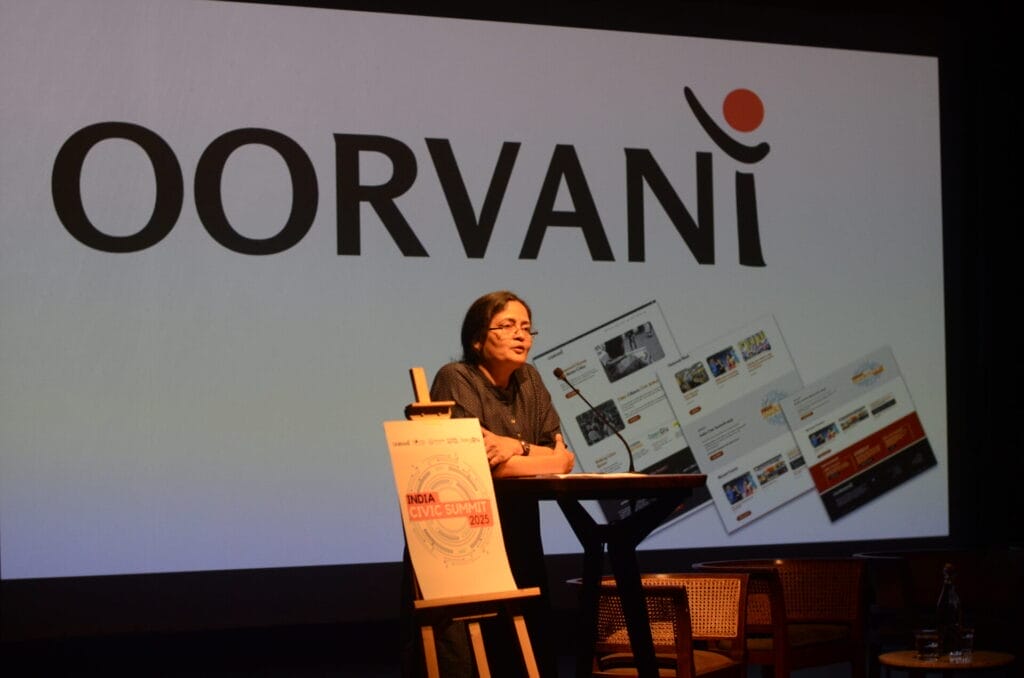
The day culminated in the Citizen Matters Spotlight section, where we showcased the works and achievements of a few citizen-led initiatives that have been actively pushing for environmental and civic sustainability and in the process, building climate resilience in their respective cities.
This was the second edition of the CM Spotlight, after last year’s maiden list, but it must be reiterated that this is not an award. This is very evidently also not an exhaustive list, but merely indicative of the vast landscape of active citizenry in various cities. It is more an acknowledgement of the continuing engagement of these citizen groups in causes central to the well-being of their respective cities.
The thought and rationale behind this acknowledgement was perhaps best summarised by Gautam John, CEO of Rohini Nilekani Philanthropies, after the event, where he said, “To say that ‘Samaaj’ is foundational, to say that citizens must co-create solutions, that citizens must participate in governance is almost glib. Because this is what it takes to do it: it takes patience, perseverance and a whole lot of grit in the face of immense structural challenges to hold on to this work… This work isn’t easy; It’s often thankless, and it’s almost always invisible. It is what moves us forward. This work matters, your work matters.”
[You can watch Gautam John’s complete speech here.]
Also, this year, we largely restricted ourselves to groups in Bengaluru, Chennai and Mumbai while curating the list of initiatives. That is not to say there are no active citizen movements steering climate or civic action in other cities. From Delhi to Pune to Hyderabad, communities and informal citizen groups are coming together to make a difference in a big way. But we chose these three cities because over the last year, this is where our reporters, citizen journalists and community anchors have closely tracked impactful grassroots efforts.
Read more: CM Spotlight 2024: A hat tip to changemakers across cities
Through their stories, we hope to inform, inspire and spur collaboration with groups who may be working on similar issues and challenges:
BENGALURU
Federation of Bangalore Lakes/Friends of Lakes
Federation of Bangalore Lakes (FOBL) is an informal citizen collective of people who care about lake conservation and water management in Bengaluru. It is a Whatsapp-based community of 67 lake groups, where they discuss best practices and ideas and also serve as a support network.
Friends of Lakes (FOL) is a core part of this – With 47 volunteers, they focus on biodiversity, water quality, legal advocacy, and community engagement. Some of the lakes they have worked to revive include Sadhenahalli, Ittagalpura, Challa Halli, and Chintamani and Doddajala lake.

Friends of BMTC
This is an informal, unregistered group active on Telegram (2760 members), Facebook (400 +followers), Twitter (3800+ followers), and Instagram (700+ followers), dedicated to promoting the use of BMTC/public transport. It has a number of young volunteers who respond to queries from the public and share advice on effectively using buses for their commute needs. It provides real-time route updates and instant information on bus routes. New routes receive immediate publicity through their social media channels.
The group also communicates with BMTC to suggest and facilitate new routes, metro feeder services, and schedule enhancements. Their efforts have led to new bus routes, better vehicle deployment, improved route visibility, and optimised depot operations for efficient service.
Zero Waste Collective
The Zero Waste Collective is an informal volunteer group comprising citizens, NGOs, RWAs, and institutions across Bangalore. It unites 21 such organisations working on waste management, fostering collaboration for greater impact.
Each initiative is led by a group or an NGO in the area, with others supporting various aspects of the work for successful implementation. Social media plays a key role in amplifying their efforts and outreach.
The primary objective of the group is to encourage recycling and upcycling, phase out use of single-use plastic and minimise waste generated at events. Their drive played a central role in making the Kadalekai Parishe a zero waste event.
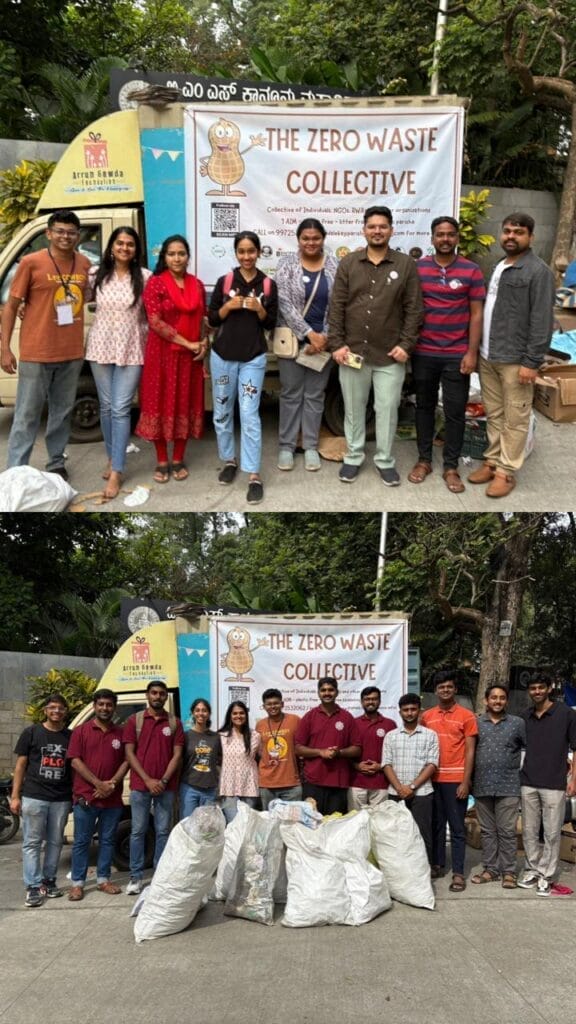
I Change Indiranagar (ICIN)
I Change Indira Nagar (ICIN) is a federation of multiple RWAs in Indiranagar, working together to address civic issues such as waste management, traffic, pollution, parking, and illegal commercialisation. Their goal is to improve civic infrastructure and ensure a safe, livable neighborhood for all residents.
Some of their key activities include protection of green spaces, protests against illegal commercialisation and activities through legal routes, and active engagement with police for better traffic management as well as enhanced law and order. The PIL filed by the group played a key role in the formulation of noise pollution laws for the city.

HSR Citizen Forum
HSR Citizen Forum is a registered NGO, but remains largely volunteer driven. With over 70 active members, plus a huge number of residents who pitch in for individual activities, they drive multiple sustainability initiatives, including waste segregation, plastic reduction, and zero-waste events, all of which significantly cut landfill contributions.
Additionally, they run awareness programmes on sustainable living, menstrual hygiene, and eco-friendly celebrations. They set up Swachagraha Kalika Kendra, a unique Sustainability Training Centre, that has hosted over 15,000 domestic and international visitors, fostering awareness and driving positive societal change through sustainable practices.
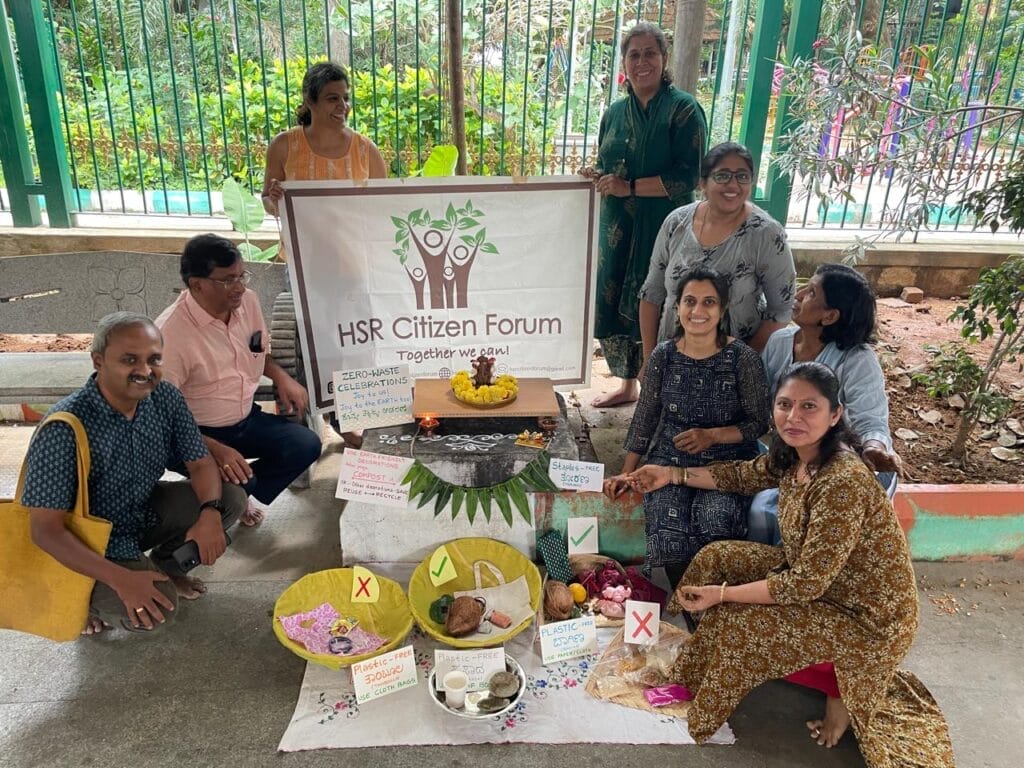
Read more: A community-centric approach to building a climate resilient Bengaluru
Friends of L Street
Friends of L Street is an informal community group of around 50 citizens from three neighbouring apartments and independent houses in Koramangala located around two streets perpendicular to each other.
The group came together 13 years back to clean up several blackspots that existed on the streets, working with BBMP and residents. Over the many years, they have sustained as a very active community working to clean, green and beautify the neighbourhood.

MUMBAI
Chandivali Citizens’ Welfare Association
Chandivali Citizens’ Welfare Association (CCWA) focuses on law, order and civic issues, collaborating closely with the BMC and local police. Established in 2018 as a registered RWA, CCWA believes social work should not be hindered by formalities. The group operates primarily via a WhatsApp group of 1,000 residents.
CCWA has advocated for infrastructure development to improve the lives of citizens, including a protest march demanding a 90 ft DP road connecting Chandivali to another link road. They also introduced the ‘Chandivalicha Manifesto’ before the recently held assembly elections in the state, advocating for lasting civic solutions.
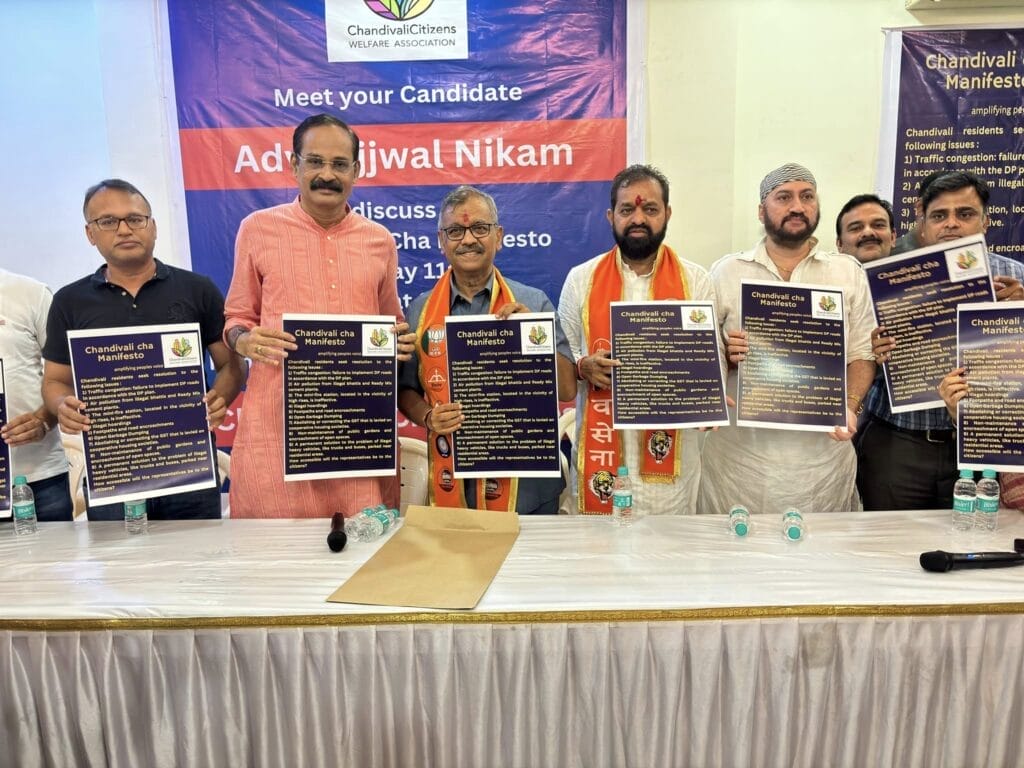
Kharghar Wetlands and Hills Group
This volunteer-driven initiative, with around 100 members and three core leaders, works to protect the hills and wetlands of Kharghar, through biodiversity studies and promoting public awareness. They began by replanting a barren hill with forest department support and successfully campaigned to remove an illegal shrimp farm threatening birdlife in a CRZ 1 zone.
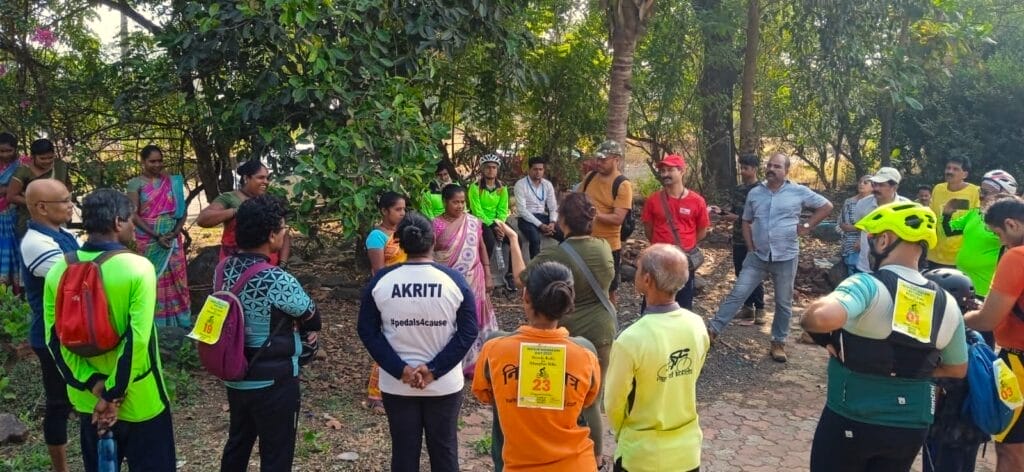
T Ward Hill Side Association
Hill Side RWA (HIRWA) has been active since 1988 and was registered in 1996, covering areas like Swapna Nagari and Yogi Hills. They operate without external funding, with members contributing voluntarily. HIRWA has fought encroachments, secured road access, installed streetlights, and advocated for water supply. They continue to engage with local civic officials even in the face of resistance from the Corporation.
As part of their advocacy for wetland conservation, they conducted and shared detailed research on the biodiversity here, following which two volunteers were included in the Wetland Brief Documentation Committee for Raigad district. They are advocating for the handing over of wetlands to the Mangrove Cell as per the orders of the High Court. They also organise nature festivals, including Mountain Day and Navi Mumbai’s first Flamingo Festival, to highlight the importance of mangroves and ecological preservation.
Their overall focus is civic betterment, ensuring land reservations for gardens and playgrounds. In 1993, their efforts ensured the relocation of a cemetery as the earlier landscape posed challenges for digging burial plots.
Read more: Opinion: Why climate action must recognise and include India’s informal workers
Pani Haq Samiti
Founded in 2010, Pani Haq Samiti is a volunteer-driven collective advocating for universal access to water. Research, advocacy, and legal action whenever necessary, form the basis of their work on the ground. The objectives of the organisation are clearly etched in their name itself. Their guiding motto is ‘Water is for life, not for commercial profits’.
With around 400 members and 250 community volunteers working across 72-74 informal settlements in Mumbai, the Samiti works to create awareness among residents here about their fundamental right to water. They also assist these communities in securing water connections, and run initiatives like ‘Chalo Jal ki Aur’ to educate people about water sources, conservation and recycling.
Their efforts have provided water to 5,000 families so far and influenced the ‘Water for All’ policy. 20 lakh families still do not have water connections and their goal is to make water connections available to them.

Chennai
IRCDUC
Information and Resource Centre for the Deprived Urban Communities (IRCDUC) is a civil society organisation focused on enhancing community capacities, promoting community-led initiatives, and advocating for land and housing rights. Key initiatives include supporting gender-based violence survivors and promoting women and child-friendly infrastructure. IRCDUC has helped many marginalised families secure land titles, and made a notable impact by improving resettlement services, and ensuring housing for 2900+ families.
One of the key activities of IRCDUC is to identify and enhance the capacities of community leaders and CBOs in the settlement through the Community Resource Hubs. IRCDUC provides support to survivors of gender-based violence, and in this endeavour, a Centre for Women and Children has been set up in the resettlement site of Perumbakkam. The safety audits initiated by women community leaders has led to many measures being put in place in resettlement sites. IRCDUC is also a member of the drafting committee for the TN Senior Citizens Policy.

Read more: Wounds of heat – Chennai’s climate catastrophe and caste
Poovulagin Nanbargal
Poovulagin Nanbargal, a 30-year-old movement in Tamil Nadu, advocates for eco-friendly policies and environmental awareness. Their key initiatives include opposing the Kudankulam Nuclear Plant and the Salem-Chennai Expressway, and campaigning against GMOs. Their efforts led to heat waves being declared a disaster. In recent elections, PN came out with environmental manifestos and their continued efforts have resulted in many political parties adopting the environmental manifestos in their own campaigns. They also initiated the formation of a climate change body.

Voice of People
Voice of People is a completely voluntary organisation. Their main objective is to promote transparency in local government operations, especially in area and ward sabhas. Key initiatives focus on raising awareness about local governance and advocating for accountability. They work on campaigns that push for greater citizen participation and government transparency in Chennai and Tamil Nadu. Notable impacts include successfully influencing local governance policies and increasing public awareness about transparency in government activities.

ROKA
Residents of Kasturba Nagar Association (ROKA) was formed in 2019 to promote good SWM practices in the extended community. It is led by a voluntary core team and has 80 members, dedicated to community collaboration for sustainable waste management and civic issues in Kasturba Nagar. Their initiatives include the ‘We Segregate’ project for community composting and soft plastic collection. They partner with Corporation schools in waste management and have recently set up a bio-gas plant in a neighbourhood school with support from the Environmentalist Foundation of India. ROKA also conducts city-wide waste collection drives, and a notable impact is that nearly 100 metric tonnes of waste materials have been sent for processing.
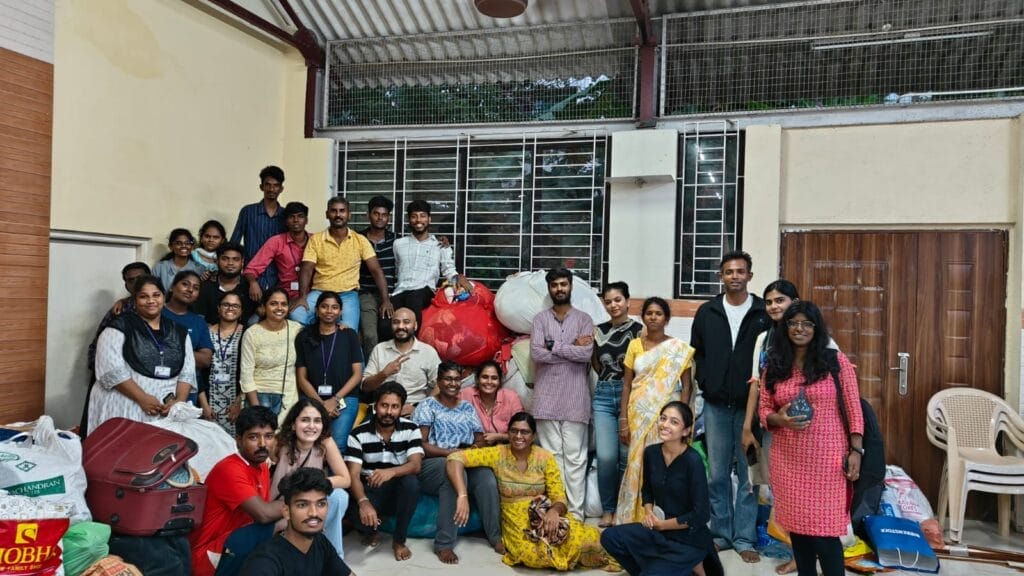
Federation of Tambaram Associations
The Federation of Tambaram Associations (FTA) is a voluntary organisation consisting of 183 Resident Welfare Associations (RWAs) within the Tambaram City Corporation. Its primary purpose is to address urban challenges and promote community building. One of the federation’s key initiatives is a helpline for those stranded during floods. FTA also reports civic issues to the Corporation and assists in voter registration, public health initiatives and welfare programmes. The federation works to ensure the protection of public properties, maintain essential services, and improve the quality of life in the community, while also advocating for residents’ rights through social audits and public interest litigations.
